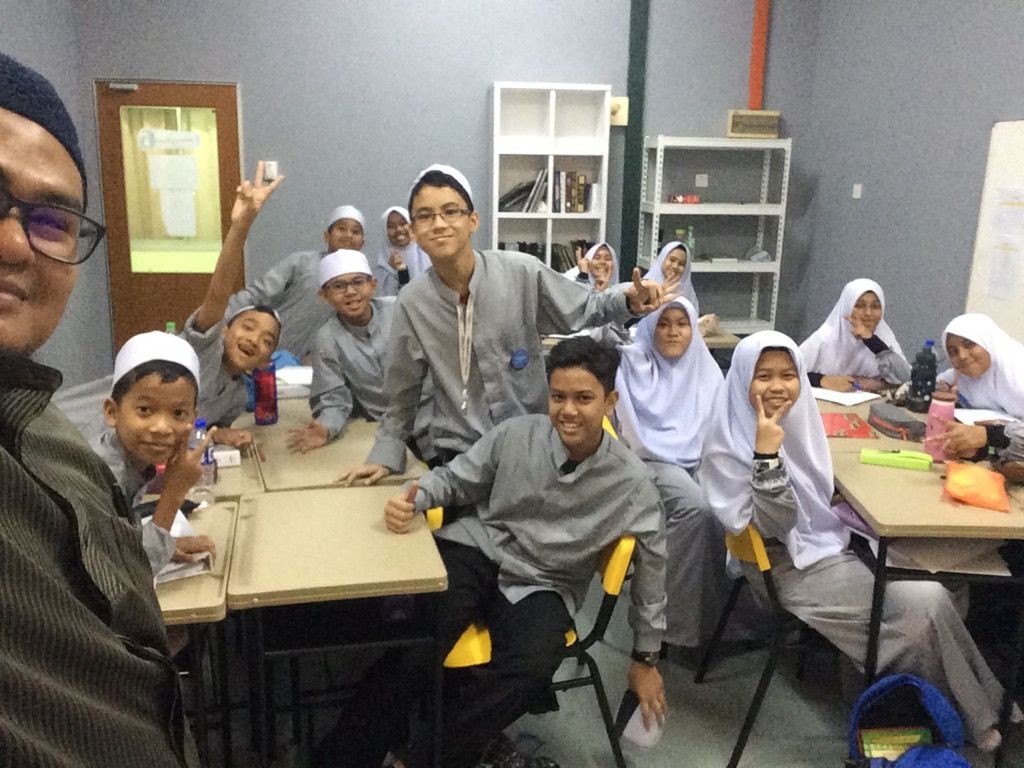Assalamualaikum WBT. Teacher and friends,
What do you currently do in your classroom teaching to embody (yourself) and reinforce (to your students) that teaching and learning is a trust and that we, as human beings, are God’s vicegerents (khalifa) on earth?
Accountability
I teach in a private school. We have no official monitoring requirement from any authority. This is utilised to nurture the culture of trust among teachers, administrators and students. We always remind each other, both teaching and learning are amanah from Allah, do with Ihsan; like you see Allah, or at least with the feeling that Allah is seeing you. We reduce written documented reportings to almost zero. We meet everyday for a short standup meeting before classes start, updating each other, and we work without asking “did you do your work, so and so”. If there is something wrong, there will be a complaint and we will entertain the complaint specifically. The routine writing reports consume a lot of energy and time, and do not promote trust.
Personalisation
The highest quality of a man to be chosen as the Khalifah; man is a reasoning being (الإنسان حيوان ناطق – الجرجاني) as described by al-Jurjani. At the beginning, Malaikah saw Adam’s potential to mischief and bloodshed, but Allah highlighted the other potential that He knows and Malaikah do no know, by demonstrating teaching, and the ability of Adam to learn, to connect meaning and names, articulating new understanding – to think.
In our school, we consider education as always about learning. No matter what happened, everything must be directed into learning. The aim is to enhance THINKING and to shape excellent character (ADAB). Therefore, we implement student-centered progressivism to achieve this, shifting away from the mainstream teacher centered mainstream education we have in this country. In each class, we use the 5 Minutes Lesson Plan to make sure we help students to learn and understand, plus 10 minutes to personalise by attending students that we think they need personal attention. If the class is a bit slow, we need personalisation on the faster minority, giving them some extra works. If the class is a bit fast, we need personalisation on the slower minority by assisting them to understand better.
Mass instruction is dangerous. We see students not as individuals but like a flock of sheeps who have similar needs to be fulfilled. The idea of teaching as amanah, requires us to enhance the differentiated instructions. The differences in learning style among students are taken into account where technology is used to accommodate certain pedagogy. Some can read text while some need the teachers to read the text and podcast it for the students to listen.
Integration
All revealed knowledge and scientific knowledge are unified at the epistemological level. Only by integrating subjects, the centrality of God can be nurtured. We promote integration. For contextual learning, we encourage teachers to collaborate in a project to demonstrate the integration.
For example, Biology leads to discussion on evolution theory. This requires some historical background both from Western history and Muslim history. Names like Charles Darwin, Herbert Spencer, Ibn Miskawayh and Ibn Arabi must be involved. The different motivation between Western scientists and Muslim scholars can be explained at the philosophical level by exploring Tafseer on al-Baqarah verse 30 onwards.
This pattern of integration is encouraged and teachers are consistently urged to read, research and be more reflective.
Embedment of Value
In the school, the oath is:
“We, as the khalifah of Allah, it is our responsibilities to make ourselves good, help others to become good, and keep the physical world good, clean and beautiful, pleasing to Allah”
We try to embed this values not only into the shaping process, but also to the academic activities.
For instance, with the spirit of helping others to become good, students are encouraged to help their peers who are poor at learning to understand which entitles them to claim some extra marks. Students who receive award for their excellency in subjects can voluntarily ‘re-award’ it to his or her friend whom they feel deserved recognition. We want to nurture this value as a common practice cross curricular.
For all subjects, students need to demonstrate their understanding on how be learning the subject, it helps him or her to become good, to help others to become good, and to keep the physical world clean and beautiful, pleasing to Allah.
We usually address our students as “Khalifah”, not “boy and girls”.
To characterise oneself as a Rabbani teacher, his or her teaching as Rabbani, and producing Rabbani students, as described by al-Imam Fakh al-Razi rahimahullah in contemplating Surah Āl-‘Imrān verse 79, one must go beyond slogan and emotion, but to reflect them on the curriculum, the instruction and the administration. Then only we as educators, differentiate ourselves from other members of the ummah, because we have a specific context, the school.
May Allah guide us and all teachers around the world to nurture the value of being Khalifah in the future generation of this ummah, ameen.
HASRIZAL
kmss.edu.my

assalamualaikum ustaz.
saya antara pembaca setia bulanan blog ustaz.
saya nak minta kebenaran ,boleh ka saya translate semua artikel berbahasa inggeris ustaz dan jadikan ianya bahasa melayu, mudah dicapai pada orang lain yang kurang tahu/faham bahasa inggeris.
credit akan diberikan semula pada blog ini.
Waalaikum al-salam WBT. Silakan sahabat, dan terima kasih saya ucapkan 🙂